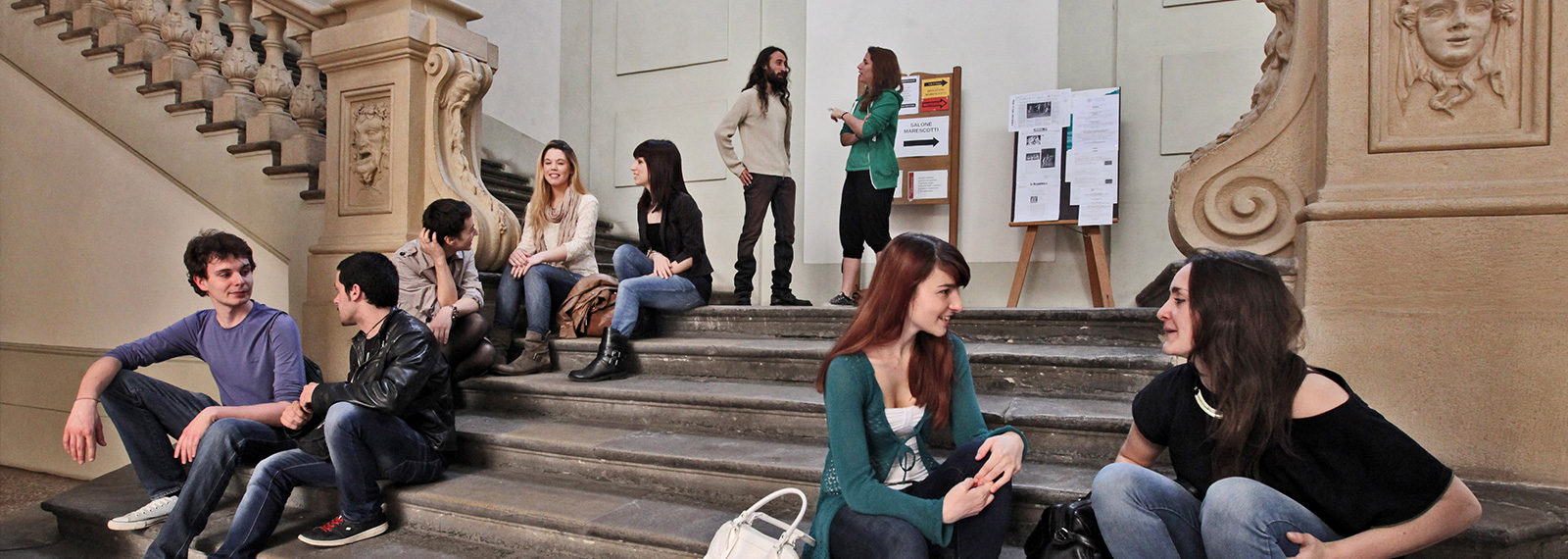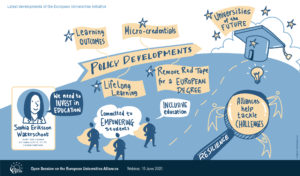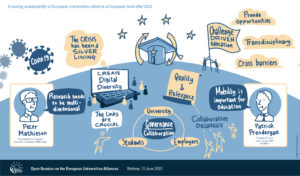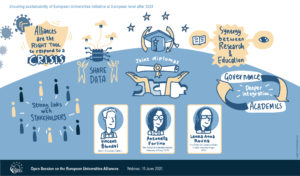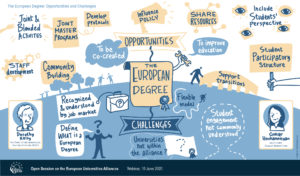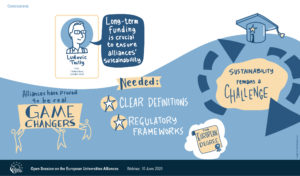2020 Open Session on the European Universities Alliances
10 June 2020
10 June 2020, webinar
On 10 June the Coimbra Group held an open session on the European Universities Alliances. The event, originally planned as a physical gathering within the programme of the Coimbra Group annual conference in Montpellier, took place in the form of a webinar due to the mobility and sanitary restrictions under the Covid-19 emergency.
On a positive note, the online delivery allowed a greater number of people to take part in the debate, with almost 600 registered participants. Among the audience were representatives from higher education institutions and European Universities’ alliances as well as key European higher education and research stakeholders, from international associations to EU institutions and national and local governments including European and national agencies.
The webinar brought together the experiences and learning of Coimbra Group member universities involved in developing European Universities’ alliances, whether already selected or under evaluation by the European Commission. The discussions focused on the sustainability of the European Universities Initiative at European level after 2023, on the European Degree and on the Covid-19 impact on the alliances’ activities.
The webinar opened with an outline of the latest developments on the European Universities Initiative by Ms Sophia Eriksson Waterschoot, Director of Youth, Education and Erasmus+ at the Directorate General for Education, Youth, Sport and Culture of the European Commission.Ms Eriksson Waterschoot emphasized that, as demonstrated by the Covid-19 crisis, deeper cooperation will be paramount for ensuring “a transformative recovery”. To this end, the role of higher education is essential in steering our common efforts towards a greener, more sustainable and digital future. The European institutions help in this endeavor by providing both policy framework and funding.
Ms Eriksson Waterschoot mentioned four relevant initiatives in the pipeline for 2020: the upcoming Communications on the European Education Area and on the European Research Area, a new Digital Action Plan and an updated Skills Agenda. She added that many opportunities will be available for higher education institutions under the new recovery instrument, Next Generation EU, for supporting infrastructure, both physical and digital. These include support from the new cohesion policy programmes and the InvestEU Facility, which the European Commission hopes that universities will use to the fullest.
This intervention was followed by a session on the topic of sustainability of the European Universities Initiative and the impact of the Covid-19 crisis on the implementation of the alliances.
Prof. Peter Mathieson, Principal and Vice Chancellor of the University of Edinburgh, presented the Una Europa’s collaborate efforts in education, research and societal engagement and how “the Covid-19 crisis is providing the momentum to build the UNA Europa’s virtual campus”. He also underlined the need for the various alliances to work closer together.
Trinity College Dublin Provost, Prof. Patrick Prendergast, talked about the CHARM-EU alliance’s take on ensuring sustainability, which relies first and foremost on “providing relevant and attractive programmes that are appealing to both students and employers”.
Prof. Vincent Blondel, Rector of UCLouvain, speaking on behalf of the Circle U. alliance, explained how some of the activities and approaches used within the alliance have proved to be useful when it came to responding to the coronavirus emergency, which shows that the alliances do offer “the right framework for helping universities dealing with a crisis”.
Prof. Antonella Forlino, Vice-Rector at the University of Pavia and representing the EC2U alliance at the webinar, informed about the development of a central interconnectivity platform called “EC2U Connect Centre”, which is designed to facilitate the sharing of resources among the alliance constituent universities and to embed the concept of “operational sustainability”. The EC2U Connect Centre will enable the delivery of joint and personalized European diplomas, an integrated inter-university campus life, a yearly gathering of citizens and academia on the occasion of the EC2U Forum and, finally, the extension of the alliance’s virtual institutes (currently focused on a number of United Nations Sustainable Development Goals (UN SDGs) ), to additional UN SDGs.
This session ended with Prof. Lenka Rovná’s intervention on behalf of the 4EU+ alliance. Prof. Rovná, Vice-Rector at Charles University in Prague, compared the creation of the 4EU+ alliance to the European integration process: both are based on “deepening and widening cooperation, trust and mutual exchange”, in this case between governance, students, academic and administrative staff. She explained that, although some universities can afford seed funding for the creation of initiatives and collaborative teams, this is not the case for all higher education institutions. While seed funding is one of the tools used to ensure sustainability, it is not enough on its own.
Prof. Dorothy Kelly, Vice-Rector at the University of Granada and coordinator of the Arqus alliance, and Ms Gohar Hovhannisyan, Vice-President of the European Students’ Union (ESU), shared their thoughts on the European Degree, which was the thematic focus of the second session. They agreed on the fact that it is important to first define what a European Degree is, what it can do for students and make sure it is recognised and understood by the labour market.
According to Prof. Kelly, the European Degree “should not be regarded as an end in itself, but rather as an instrument to enhance learning outcomes and strengthen European and global citizenship”. Ms Hovhannisyan added that defining what it is will ensure students’ right to it. All students within an alliance, said ESU’s Vice-President, “should be able to rely on the fact that they can obtain a degree from any of the constituent universities under the same rules and conditions”.
When asked about the perspective from the European Commission, Ms Eriksson Waterschoot said that the institution is intending to put forward a Council recommendation and is currently in the collection phase for feedback and input. She added that Member States do not share a common opinion about the European Degree so this process will require a balancing act.
Finally, Prof. Ludovic Thilly, Chair of the Coimbra Group Executive Board and moderator of the open session, concluded the webinar by underlying how the European University alliances “have proved to be real game changers” and that the challenges related to their sustainability persist and ought to be addressed with long-term funding from both the European Commission and the Member States not only depending on calls for proposals.
The 10 June event was the first one of a series where the Coimbra Group aims at playing the role of a European platform to bring and exchange together the experiences and learning of Coimbra Group member universities involved in developing Alliances and beyond.
Since the very start in 2018, the Coimbra Group has been actively involved in the co-design process of the European Universities initiative with the European Commission and has made the strong political choice to provide support to all Coimbra Group Universities during the first and second calls of the pilot phase. This support will continue during the next Erasmus+ Programme and is already manifold:
* Coimbra Group associated partnership to a number of Alliances on knowledge sharing and dissemination (Una Europa, CHARM-EU, EC2U and Circle U.);
* a recurring section in the Coimbra Group monthly Newsletter;
* a series of open sessions on the European Universities’ alliances.
KEY TAKEAWAYS
- European Universities alliances have demonstrated to be real game-changers in the field of European and international knowledge. Their structure has proved to provide the right framework for universities to address global challenges, as shown by the ways they have been responding to the Covid-19 crisis. Structured cooperation among alliances would be very useful and beneficial to all parties involved.
- The financial sustainability of the alliances still remains a major challenge though: there was unanimity on the fact that long-term funding support is absolutely needed from the European Commission and the Member States. The alliances will not be sustainable only on the basis of calls for proposals (Erasmus+, FP9, etc.).
- Although each alliance has developed a sustainability plan, whether in operational or financial terms, these efforts are not sufficient in relation to the scale of the endeavour. It was suggested that looking at the various funding models would be a useful exercise.
- The European Union can offer support beyond the education and research framework programmes: opportunities will be available for higher education institutions under the new recovery instrument, “Next Generation EU”, for supporting infrastructure, both physical and digital.
- Policy and regulatory developments are necessary. The European Universities Initiative provides a framework for creating a European Degree but a good balance of European and national measures will be needed to ensure the removal of existing barriers not only for the first pilot initiatives, but beyond them to systemic level.
- There was general agreement on the need for a clear definition of what a European Degree is and what it can do for students. It is important to have a collective reflection on this. Agreeing on a clear definition will ensure that all students have a right to it. This degree should not be regarded as an end in itself, but rather as an instrument to enhance learning outcomes and strengthen European and global citizenship.
- The European Commission is intending to put forward a Council recommendation on the European Degree and is currently in the collection phase for feedback and input. It appears that Member States do not share the same opinion about the European Degree so this will require a balancing act. The European Commission is also exploring the feasibility of a European Statute for European Universities and other university alliances. This has generated a number of questions from the audience.
- Governance modality was identified as one of the challenges when it comes to the implementation of the alliances’ activities. It may be useful to examine the different governance models existing within the alliances.
- Communication, both horizontal and vertical, as well as the means through which communication within an alliance is done, also appears to be an issue.
- The Covid-19 crisis has spotlighted the role and value of universities in their ecosystems: citizens involvement in research and the way universities communicate science to society were mentioned as key elements in the university-society partnership. The European Universities alliances will surely contribute to develop new types of synergies/partnerships with public and private stakeholders.
- Relevance and attractiveness will establish the viability and sustainability of the Alliances.
- Some of the ways in which the alliances are addressing their sustainability include: providing highly attractive student- and employer-centred study programmes, focusing on multidisciplinary and international research, data sharing, annual fora with their local communities, synergy between education and research, governance approaches which are at once top-down and bottom-up, securing seed funding to launch collaborative initiatives, collaborating in accordance with the principles of trust and openness.
- Research and education components of the European Universities Alliances are inseparable.
* The recording of the Open Session on the European Universities Alliances is now available on the Coimbra Group Youtube Channel.
* Please find here below the graphic storytelling of the event, developed by creative facilitator Christopher Malapitan (@chriskem). Click to enlarge.


